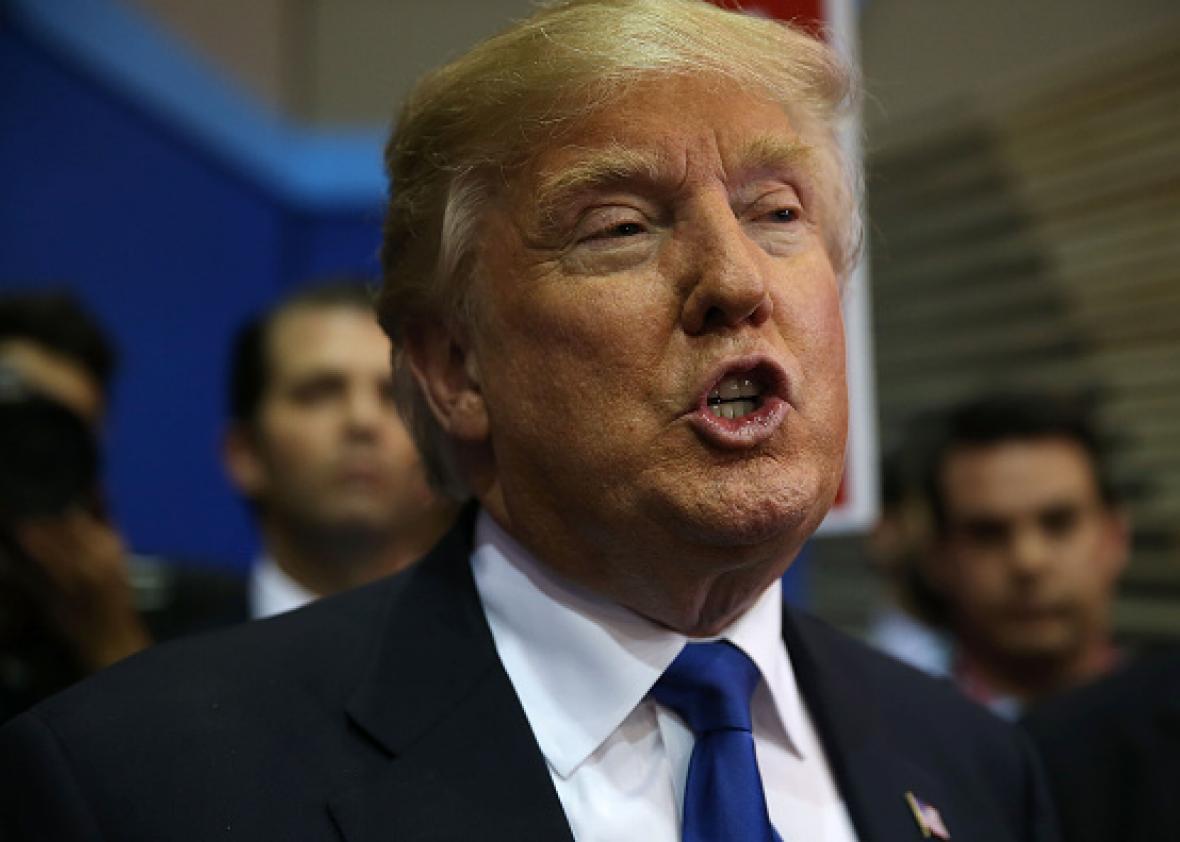For the first time in the GOP presidential race, the Republicans who want the nomination are turning their aim to the outsider who’s running away with it.
From the jump at Thursday’s pre–Super Tuesday CNN debate, Marco Rubio was in Donald Trump’s face. “You’ve hired a significant number of people from other countries to take jobs that Americans could have filled,” said the Florida senator, blasting Trump for using unauthorized labor. Rubio hit Trump on his bankruptcies, and hit him on the scandal that is Trump University. And it was effective. Trump looked rattled. He couldn’t talk over Rubio and couldn’t give a good response. But after muddling through a question on immigration, Rubio lost the thread of these attacks later in the debate.
Ted Cruz attacked too, but he went to more familiar ground, hitting Trump for his ideological heterodoxy. “Nobody who supports far-left liberal Democrats who are fighting for judicial activists can possibly care about having principled constitutionalists on the court,” said the Texas senator, questioning Trump’s commitment to finding a suitable replacement for the late Supreme Court Justice Antonin Scalia. Rubio, himself a strongly ideological conservative, jumped in, attacking Trump for his commitment to a health care system—possibly under some form of government involvement—that wouldn’t let Americans “die on the streets.” “This is a Republican debate, right?” asked Rubio at the end of this exchange.
On Twitter, pundits and observers were thrilled with this skirmish. Finally, Republicans were hitting Trump and taking his threat seriously. “Best thing Rubio has done is to belittle Trump, undercutting him when he tries to apply his ‘dealmaking’ to everything,” tweeted Philip Klein of the Washington Examiner. “Exposing ignorance.” Likewise, said Ian Tuttle of National Review, “Interruption is succeeding for Trump, but Rubio & Cruz have looked like adults and his equals—and on substance, obviously his superiors.”
Both statements are true. But does that matter?
Earlier this week in Nevada, I attended two events for Trump. One, at an arena in the south of Las Vegas, was a last hurrah before the caucus. The other, the next night, was to celebrate Trump’s massive victory in that caucus. When I spoke to Trump supporters, at both events, I heard a single refrain: Trump says what we’re all thinking, Trump doesn’t talk down to us.
These aren’t idle comments. Trump has ideas and beliefs, but he’s not winning because Republicans back his policies or hold his ideology. He’s winning because, like the most effective demagogues, he’s built an emotional bond with his audience.
Somehow, pundits don’t see this, and so they cheer for Rubio’s attacks on Trump’s knowledge and Cruz’s attacks on Trump’s ideology (or lack thereoef), blind to the fact that competence and belief are orthogonal to his appeal. They’re not even key to actual Republican voters, who Trump’s rise has shown are more tribal than ideological.
They don’t care that Trump doesn’t have specifics, that he can’t give details on the wall with Mexico, or his trade war with China. What they see is that Trump is like them. He talks like them. He jokes like them. He shares their anger and their prejudice. He shares their fear. He even talks about the government like they do. Majorities of Americans think their tax dollars go largely to foreign aid; they think we spend too much on other countries when there are problems in the United States that need solving. When Trump says, “We’re losing so much with Mexico and China,” he’s speaking directly to millions of Americans who think they’re funding adversaries and enemies, at the cost of their own opportunity and success.
On the same score, Trump speaks to a deep fear of loss, a product of the trauma of the Great Recession. It’s the basis for his entire riff on health care. “We are going to have private health care,” he said, “but I will not allow people to die on the sidewalks and the streets of our country if I’m president.”
All of this is why Cruz and Rubio will fall flat with their attacks. For the most part, they hit him from the right, as if Trump was just another politician, walking an ideological bridge too far. But that’s wrong. Trump doesn’t win his support from the most conservative Republicans; his base is among moderates and “somewhat” conservative voters. On the same score, it doesn’t make sense to hit Trump for his lack of policy knowledge. He isn’t winning because he’s competent; he’s winning because he connects with millions of Republicans who feel, strongly, that their leaders aren’t interested in them or their lives. Trump, more than anyone else in the GOP field, feels their pain.
The only way to stop Trump is to attack that and discredit the idea that Trump is anything but selfish. You need to show that he’s a con man who doesn’t care about them, who will exploit their trust and discard them as soon as he wins power. In short, you need to break those bonds of empathy and show Trump for the liar and opportunist that he is.
Which is why, of all the attacks on Trump, the only one that landed—that has resonance with his supporters—is Rubio’s Halloween Gambit to knock Trump off balance with his blows on Trump University, which goes after the core of Trump’s appeal. Show that he exploited ordinary Americans, and you mar his facade of compassion and understanding.
If Team Rubio is smart, it will focus all of their fire on this point, and force Trump to respond. No, it won’t be enough to save Super Tuesday, where Trump holds a definitive lead. But it might be what it takes to block Trump before it’s too late, and finally open Rubio’s path to victory.
